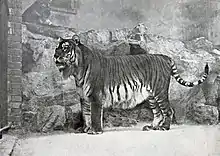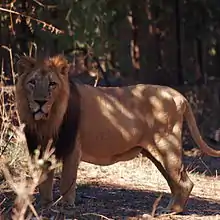Shirvan State Reserve
Shirvan State Reserve was established on the area of 177.45 square kilometres (68.51 sq mi) of a part of Bendovan State Game reserve in 1969 for the purpose of protecting and increasing the number of water birds. The area of the reserve was expanded to 258 square kilometres (25,800 ha) in 1982.[1]
Ecology

The reserves is characterized by rich ornithological fauna. Water reserves account for 35 square kilometres (14 sq mi) of the area. Rare and valuable birds nest and winter in the swampy areas. The largest part of the reserve was transferred to the Shirvan National Park in 2003, and the area of the reserve currently totals 62.32 square kilometres (24.06 sq mi).[1]
Fauna and flora
Etymology

The names of the reserve and national park appear to be derived from the word Shīr (Persian: شیر, 'Lion'). The Asiatic lion used to occur in the Trans-Caucasus, including this area, before the end of the 10th century. A reason for its extinction here is that it was hunted by hunters, including 'shirvans' or 'shirvanshakhs', who were native to the Trans-Caucasus.[3]
See also
- Nature of Azerbaijan
- National Parks of Azerbaijan
- State Reserves of Azerbaijan
- State Game Reserves of Azerbaijan
References
- Ecotourism
- Heptner, V. G.; Sludskij, A. A. (1992) [1972]. "Tiger". Mlekopitajuščie Sovetskogo Soiuza. Moskva: Vysšaia Škola [Mammals of the Soviet Union. Volume II, Part 2. Carnivora (Hyaenas and Cats)]. Washington DC: Smithsonian Institution and the National Science Foundation. pp. 95–202.
- Heptner, V. G.; Sludskij, A. A. (1992) [1972]. "Lion". Mlekopitajuščie Sovetskogo Soiuza. Moskva: Vysšaia Škola [Mammals of the Soviet Union. Volume II, Part 2. Carnivora (Hyaenas and Cats)]. Washington DC: Smithsonian Institution and the National Science Foundation. pp. 82–95.
| Wikimedia Commons has media related to Shirvan State Reserve. |